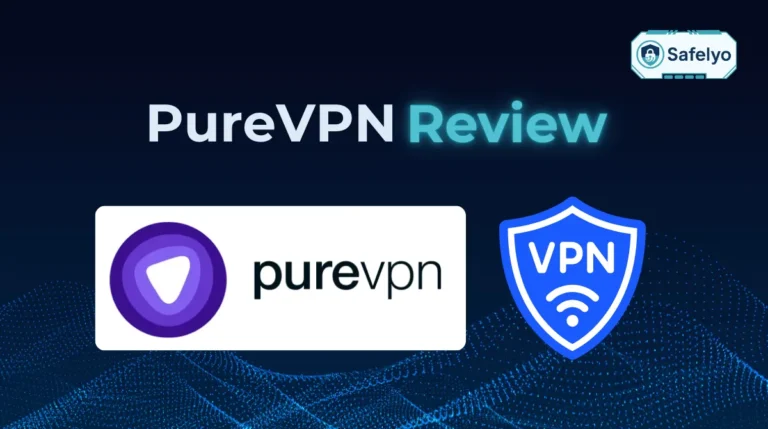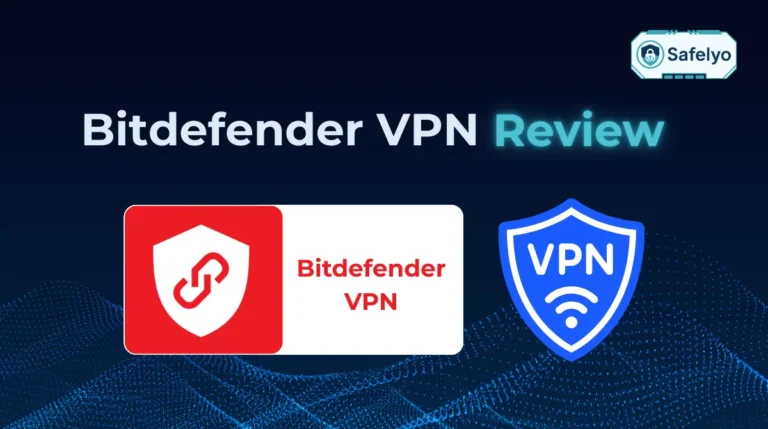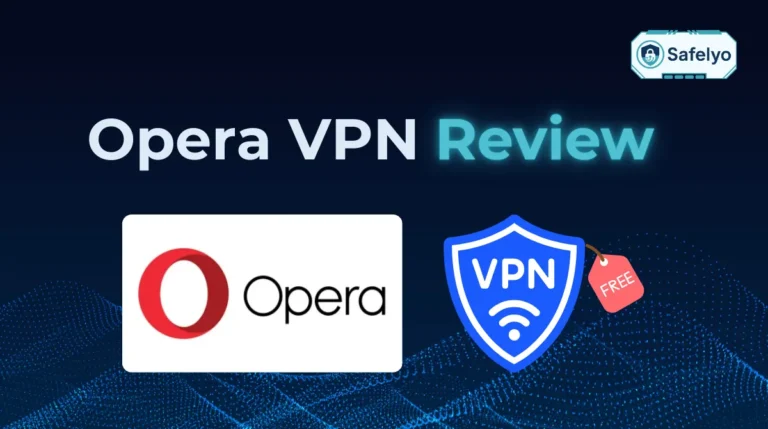When you think of a VPN, you probably picture complex maps, but the TunnelBear VPN is a different kind of VPN. TunnelBear throws all that out the window, greeting you with cartoon bears and a design so simple it feels more like a friendly app than a serious security tool.
But that’s the million-dollar question we tackle in this TunnelBear review: Is this VPN all charm, or does the TunnelBear VPN have bite? In a world of aggressive cybersecurity marketing, TunnelBear’s playful approach is a breath of fresh air.
Having tested dozens of VPNs – from the most technically demanding to the most basic – I know the biggest barrier to online safety often isn’t the technology itself, but the intimidation. That’s why finding a tool that’s both approachable and effective is so crucial. We’re here to see if TunnelBear strikes that perfect balance.
In this deep dive, I’ll help you discover:
- Who TunnelBear is truly perfect for (and who should run away).
- How its speeds hold up in real-world tests.
- The truth about its free plan and annual security audits.
Let me help you decide if this is the perfect first VPN for you, or if you should look for a more powerful beast.
VPN Score:
6.8 / 10
The Friendliest First VPN for Absolute Beginners
| Feature | Details |
| VigilantBear | This is TunnelBear’s Kill Switch. It automatically blocks all your internet traffic if the VPN connection unexpectedly drops, ensuring your real IP address and data are never exposed. |
| GhostBear | This is the Obfuscation feature. It works by disguising your encrypted VPN traffic to look like regular internet traffic, helping you bypass restrictive firewalls at work, school, or in countries with censorship. |
| SplitBear | This is Split Tunneling. It gives you the flexibility to choose which apps or websites go through the secure VPN tunnel and which ones connect directly to the internet. |
| Annual Security Audits | A key trust feature. TunnelBear hires independent cybersecurity firms every year to publicly audit its apps, code, and infrastructure to verify its security and privacy promises. |
BEST FOR:
TunnelBear is best for complete VPN beginners and non-technical users who feel intimidated by complex software. Its ideal use case is for individuals who simply need basic, one-click protection to secure their internet connection on public Wi-Fi networks at places like cafes, airports, and hotels. It’s a perfect, gentle introduction to the world of VPNs. It is not recommended for streaming, gaming, torrenting, or for any user who requires high speeds and maximum privacy.
1. TunnelBear at a glance: The beginner’s scorecard
Don’t have time for a full deep dive? No problem. Think of this as TunnelBear’s school report card, graded by us at Safelyo. It gives you a quick, honest look at where this VPN shines and where it struggles.
Ease of Use & Fun Factor (10/10)
This is TunnelBear’s star subject. Using it is as easy as flipping a switch, and the animated bears digging tunnels on the map make it genuinely enjoyable. It’s practically impossible to get confused with the TunnelBear VPN, even if you’ve never touched a VPN before.
Trust & Transparency (8/10)
TunnelBear earns high marks here by publishing independent security assessments every single year. For me, this is like a restaurant proudly displaying its health inspection certificate in the window. It shows they have nothing to hide.
Basic Security (7/10)
For everyday tasks like using public Wi-Fi at a café or airport, TunnelBear is solid. For basic security, the TunnelBear VPN uses strong AES-256 encryption. This level of encryption acts like a sturdy lock on your data, keeping casual snoops out. The encryption is solid.
Free Plan Limitations (4/10)
The 2GB free plan is a great taste test, but it runs out incredibly fast. Think of it as a free sample of ice cream – delicious, but it’s gone in just a few spoonfuls, leaving you wanting more.
>> See more options at he 5 best free VPN in 2025 that are actually safe
Speed & Performance (3/10)
This is where the bear slows down, partly because it lacks the ultra-fast WireGuard protocol found in top competitors. It’ll get you where you’re going, but expect a much slower journey.
Advanced Features (2/10)
TunnelBear is a point-and-shoot camera, not a professional DSLR with a bag full of lenses. It does one job, but lacks advanced features like protocol selection; users cannot switch to modern options like WireGuard and must rely on defaults like OpenVPN.
The Bottom Line
From my perspective, here’s the final word on the scorecard: TunnelBear is an excellent and safe choice for absolute beginners or infrequent users who need basic protection. However, its slow speeds and lack of features mean anyone serious about streaming, P2P file sharing, or privacy will quickly outgrow it.
2. Who is TunnelBear perfect for?
A VPN isn’t a one-size-fits-all tool. A hammer is great for a nail, but terrible for a screw. In my experience, the happiest users are those who pick the right tool for their specific job. This section of our TunnelBear review is designed to help you do just that.
2.1. TunnelBear is your best friend if
You’ll absolutely love TunnelBear if you find yourself nodding along to any of these points:
You're a complete VPN beginner and feel intimidated.
Other VPN apps can be confusing, but the TunnelBear VPN is incredibly user-friendly. TunnelBear is different. It’s a single, friendly button. If the thought of “configuring a VPN” makes you nervous, this is your safe starting point.
You just need to secure your connection on public Wi-Fi.
Think about the Wi-Fi at your local coffee shop, the airport, or a hotel. Using it without a VPN is like sending your private information on a postcard for anyone to read. TunnelBear encrypts that connection, putting your data inside a sealed, tamper-proof envelope. It’s perfect for this simple, yet vital, task.
>> You may also be interested in: 5 best VPN for public Wi-Fi security in 2025 (tested)
You only need a VPN for a few minutes each month.
Maybe you just want to check your bank balance while traveling or quickly access a region-blocked article. If you don’t need a 24/7 VPN, the free 2GB plan is like a handy screwdriver – useful for quick jobs and completely free.
You appreciate a fun, well-designed user experience.
Let’s be honest, sometimes we choose an app just because it’s pleasant to use. The cute bear animations aren’t just a gimmick – they make the act of securing your connection feel friendly and less like a chore.
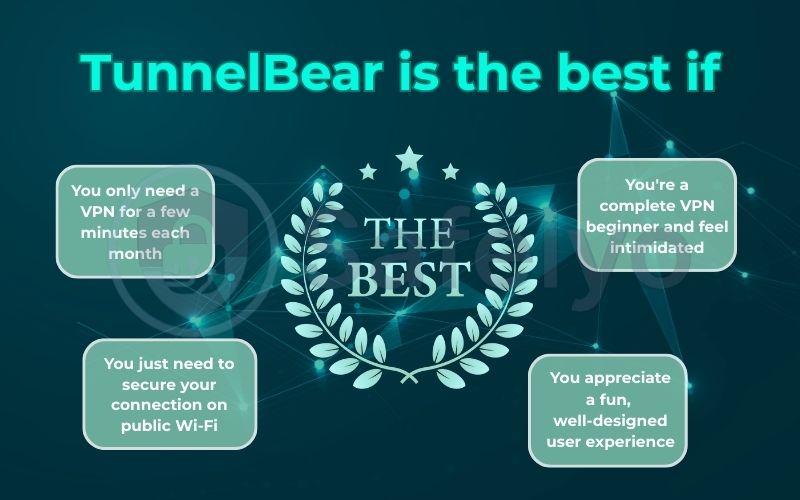
2.2. You should look for another VPN if
On the other hand, TunnelBear will likely frustrate you if your needs are more demanding. Be honest with yourself – if any of these sound like you, you should definitely consider a more powerful option:
You want to stream Netflix, Hulu, or BBC iPlayer.
This is a non-starter for Netflix. Trying to unblock Netflix libraries with the TunnelBear VPN is a game of chance you’ll lose. Netflix actively blocks this VPN. Expect to see the dreaded loading wheel far more often than your favorite show. There are many other best VPN for streaming built specifically for this purpose.
You download or upload large files via torrents.
While TunnelBear technically allows torrenting, its slow speeds make it a painful experience. Downloading a large file can feel like watching paint dry. For torrenting, you need a combination of speed, security, and a P2P-friendly policy that TunnelBear simply can’t provide effectively as the best VPN for torrenting.
You are a gamer who needs the lowest possible latency.
To evaluate the best VPN for gaming, every millisecond counts. That delay, known as “ping,” can be the difference between victory and defeat. TunnelBear, with its slower speeds, will significantly increase your ping. It’s a guaranteed way to put yourself at a disadvantage.
You are a journalist, activist, or anyone needing the highest level of privacy.
This is the most critical point. TunnelBear is based in Canada, a member of the 5-Eyes intelligence-sharing alliance. For the average user securing coffee shop Wi-Fi, this is a low risk. But for someone whose safety and freedom depend on absolute anonymity, this jurisdictional risk is an unacceptable gamble.
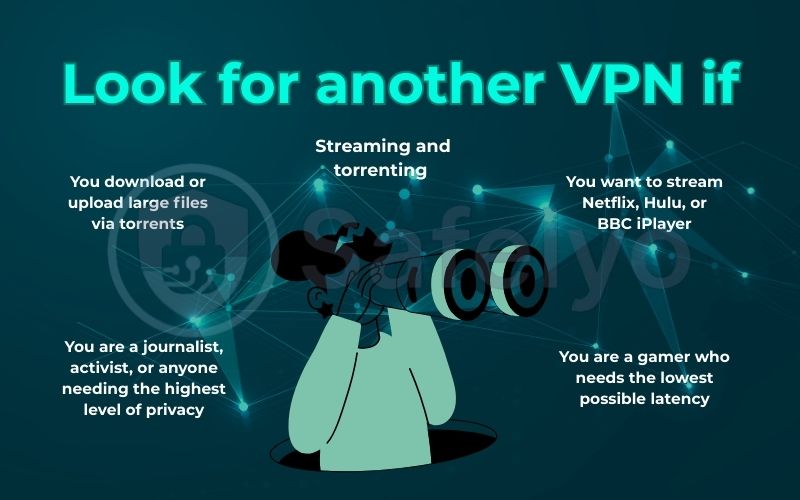
>> Read more:
3. Hands-on test: The good, the bad, and the bears
Alright, enough theory. To give you the most honest TunnelBear review, I downloaded the app onto my laptop and phone, connected to its servers, and put it through its paces. I wanted to see what it really feels like to use this VPN day-to-day. Here’s what I found.
3.1. The user experience: It doesn’t get simpler than this
From the moment I launched the app, I understood TunnelBear’s main appeal. There are no complicated settings or confusing menus. You are greeted with a simple world map and a big “On/Off” switch.
The best part? The experience is just plain fun. When you pick a country to connect to, a cute animated bear actually digs a tunnel across the map and pops out at your destination, accompanied by a satisfying roar. It sounds silly, but it’s this kind of delightful detail that makes a potentially dry task feel engaging.
The settings are just as friendly, using playful “bear-themed” names for their features. This can be a bit confusing at first, so I’ve translated them for you.
Decoding the Bear Lingo: A Quick Guide
TunnelBear has its own language for standard VPN features. Here’s what they actually mean:
- VigilantBear: This is a Kill Switch. This crucial leak protection feature, VigilantBear, stops your internet if the VPN disconnects, preventing data leaks. Think of VigilantBear as a vigilant guard bear protecting your privacy.
- GhostBear: This is Obfuscation. This feature makes your VPN traffic look like regular internet traffic, a process known as traffic obfuscation. This is useful for getting around restrictive networks (like at a school or office) or in countries with heavy censorship. It’s a bear in disguise!
- SplitBear: This is Split Tunneling. It lets you choose which apps go through the encrypted VPN tunnel and which ones use your regular internet connection. For example, you could have your web browser use the VPN while your online game connects directly for better speed.
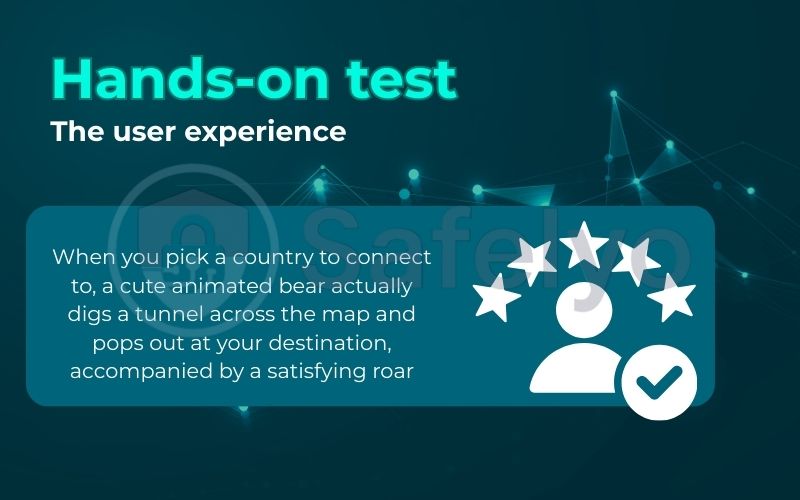
3.2. Speed test: The bear is slow, but how slow?
Let’s be upfront: I wasn’t expecting TunnelBear to win any speed races. But the question was whether it’s fast enough for normal, daily activities.
To put it simply, my internet connection felt like it went on a diet, which is common when testing protocols like OpenVPN. My baseline connection speed without a VPN is a zippy 100 Mbps. Here’s what happened when I turned TunnelBear on:
- Connecting to a nearby server (in the US): My speed dropped to around 35 Mbps.
- Connecting to a distant server (in the UK): The speed plummeted to just 12 Mbps.
What does this mean in practice? The 35 Mbps speed was fine for basic web browsing and sending emails, though pages took an extra second or two to load. But at 12 Mbps, things got sluggish. I started seeing the dreaded buffering wheel on a standard HD YouTube video, and downloading a simple PDF file took noticeably longer.
The verdict
While the speeds highlight potential performance issues, they are sufficient for light browsing. Don’t expect to be doing any heavy lifting.
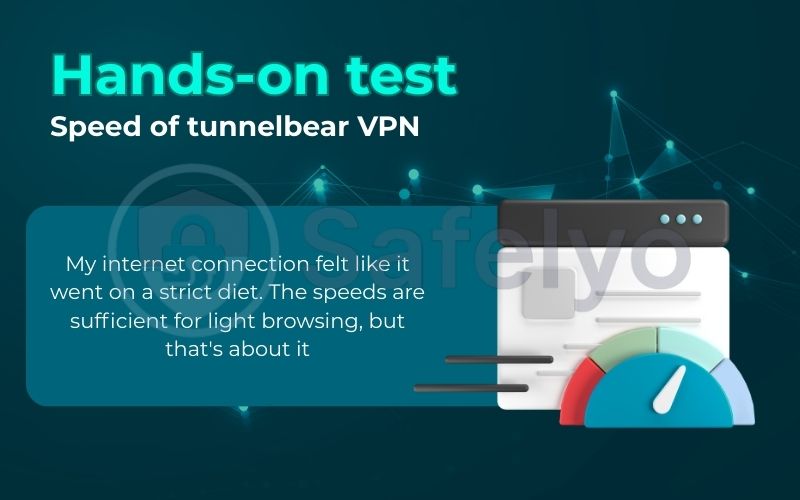
3.3. Streaming and torrenting: A frustrating experience
This is where the bear stumbles and falls, hard.
For streaming, I tried my luck with the big platforms like Netflix, Hulu, and BBC iPlayer. In almost every single test, I was blocked at the door and met with the infamous “proxy error” message. TunnelBear simply doesn’t have the technology to consistently bypass the tough geo-blocks that streaming services put up.
When it comes to torrenting, the story isn’t much better. While TunnelBear doesn’t forbid it, trying to download files was a lesson in patience. The combination of slow speeds and limited server locations makes it a deeply impractical choice. Using TunnelBear for torrenting feels like drinking a thick milkshake through a coffee stirrer, it’s the wrong tool, and frustration hits fast.
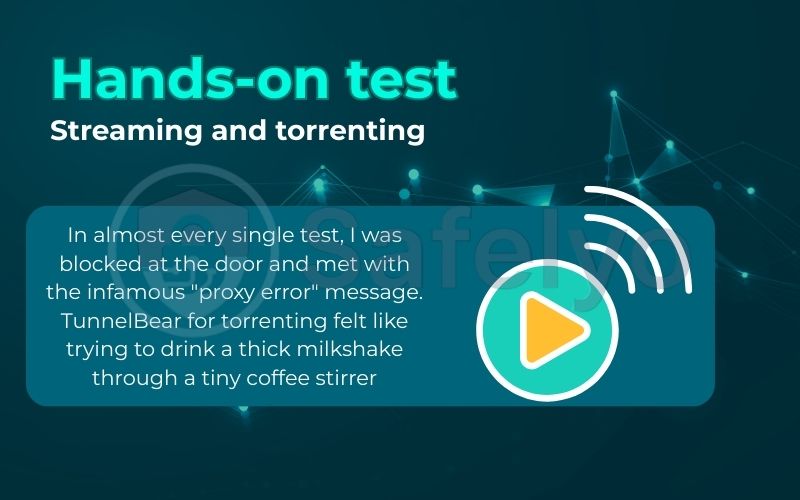
4. The trust equation: Annual audits vs. 5-eyes ownership
When you use a VPN, you’re placing a huge amount of trust in the company behind it. You’re trusting them to protect your most sensitive data. So, the big question is: Is TunnelBear trustworthy?
From my analysis, the answer is a classic “it’s complicated.” It’s a balancing act between a huge positive and a significant negative. To make it crystal clear, let’s put these two opposing forces side-by-side:
| The Trust Builder (The Plus Side) | The Risk Factor (The Minus Side) |
| The Action: Annual independent security audits. | The Fact: Based in Canada (a 5-Eyes country) and owned by US-based McAfee. |
| The Meaning: They openly prove their technology is secure, and they have nothing to hide. | The Risk: They could potentially be legally forced to share user data with government agencies. |
| The Analogy: Like a restaurant proudly displaying its A+ health inspection certificate. | The Analogy: Like telling a secret to a friend who is known to share gossip with four other people. |
| Who It Affects: Reassuring for average users who want proof of security. | A deal-breaker for journalists, activists, or anyone needing maximum anonymity. |
Now, let’s dive deeper into what each side of this equation really means.
4.1. The Plus Side: A Leader in Transparency
This is where TunnelBear truly shines and earns my respect. They are one of the very few VPN providers that voluntarily undergo and publish independent third-party reviews every single year.
Think of it this way: TunnelBear says it follows a strict no-logs policy, meaning it doesn’t store details about what users do online. Its public privacy policy also confirms this claim. To verify such promises, it’s important to review the privacy policy carefully. A security audit happens when the company brings in a trusted third-party cybersecurity firm to thoroughly test its apps, servers, and code. The auditors then release a public report confirming whether the company’s privacy claims hold up.
This is a massive sign of good faith. It’s like a chef inviting a food critic into their kitchen to inspect every ingredient and every process. By consistently doing this year after year, TunnelBear proves they aren’t just making empty promises about security – they’re willing to be held accountable.
4.2. The Minus Side: A Concerning Home Address
Now for the other side of the equation. TunnelBear has two issues when it comes to its location and ownership:
- It’s based in Canada: Canada is a key member of the 5-Eyes intelligence-sharing alliance (along with the US, UK, Australia, and New Zealand). Imagine a group of five close friends who promise to share any gossip they hear with each other. The 5-Eyes countries have agreements to share intelligence data. This means that, in theory, the Canadian government could legally compel TunnelBear to hand over user data, and that data could be shared with other member nations.
- It’s owned by McAfee: In 2018, TunnelBear was bought by McAfee, a major American cybersecurity company. This adds another layer of concern, as the United States is the most powerful member of the 5-Eyes alliance.
The Safelyo Verdict
So, how do you balance these two factors? Here’s my take: It depends entirely on who you are.
- For the average user, whom TunnelBear primarily targets, its consistent independent reviews provide strong assurance. The risk from its legal authority is real but largely theoretical for everyday activities like securing public Wi-Fi. The audits prove the tech is solid, which is what matters most for this group.
- However, for journalists, activists, or anyone with critical privacy needs, this risk is unacceptable. If your work or personal safety depends on your online activity remaining completely anonymous, you simply cannot take the chance of using a service based in a 5-Eyes country. For you, the minus side of this equation far outweighs the plus.
5. TunnelBear free vs. paid: Is it worth upgrading?
TunnelBear’s free plan is what brought you here. It’s one of its most famous features, but also its most misunderstood. The main – and frankly, only – difference between the free and paid plans is the amount of data you can use. The free tier gives you a tiny 2GB per month.
But what does that actually mean? Let’s put it in perspective.
What can you REALLY do with 2GB of data?
Think of 2GB as a small monthly allowance. Here’s roughly what you could spend it on:
- Web Browsing: About 10-12 hours of general surfing.
- Listening to Spotify: Roughly 25 hours of music streaming.
- Watching YouTube (in Standard Definition): Around 1.5 to 2 hours.
- Watching Netflix (in High Definition): Forget it. You’d be lucky to get through a single 20-minute episode of a sitcom.
As you can see, this free version is only useful for very short, infrequent tasks.
So, this brings us to the key question: Should you pay to get unlimited data?
My honest advice is that for most people, the answer is NO. If your needs are so basic that the free tier is almost enough, then paying for unlimited data on a service this slow and feature-light doesn’t make much sense. It feels like paying for a bigger gas tank on a slow scooter when you could get a faster car for the same price.
Considering the Tunnelbear price for unlimited data, your money is likely better spent on a more powerful, faster, and more capable VPN like NordVPN or Surfshark.
And if your main goal is to find the best free option? Well, TunnelBear has some serious competition there, too.
Quick Comparison:
TunnelBear Free vs. Proton VPN Free
When the 2GB limit feels too tight, many users look for another free option. Here’s how TunnelBear stacks up against the other top contender, Proton VPN.
| Feature | TunnelBear Free | Proton VPN Free |
| Data Limit | 2GB per month | Unlimited |
| Ease of Use | Winner. Incredibly simple. | Good, but more traditional. |
| Servers | Access to ~45 countries | Access to 3 countries |
| Speed | Slow | Slow (but often more stable) |
The Verdict
If you value ultimate simplicity for very brief tasks, TunnelBear is fine. But if you need unlimited data for basic protection without worrying about a cap, Proton VPN’s free tier is the hands-down winner.
6. FAQ around the TunnelBear review
We’ve gathered the most common questions people ask about TunnelBear. Here are the quick, no-fluff answers from our hands-on TunnelBear review to help you make a fast decision.
Can TunnelBear be trusted?
Yes, but with an important caveat. From a technical perspective, TunnelBear is very trustworthy thanks to its strong encryption and consistent annual security audits. However, its base in Canada (a 5-Eyes country) and its ownership by US-based McAfee create a jurisdictional risk that is unacceptable for users with high-level privacy needs.
Is TunnelBear better than NordVPN?
According to most user reviews and our tests, no. For almost every practical use case, NordVPN is significantly better and offers more responsive customer support. If you have a problem, TunnelBear’s customer support can be slow. NordVPN is vastly superior in speed, streaming ability, server network size, and advanced features. The only area where TunnelBear could be considered “better” is its extreme simplicity and fun interface, which might appeal more to an absolute first-time user who feels intimidated by technology.
Is ExpressVPN better than TunnelBear?
Yes, ExpressVPN is a premium service that outperforms TunnelBear in every performance category. Much like the comparison with NordVPN, ExpressVPN offers faster speeds, reliable streaming access, and a larger server network. It is a high-performance tool, whereas TunnelBear is a basic-use tool.
What are the biggest disadvantages of TunnelBear?
Its main disadvantages are very slow speeds, an inability to unblock most streaming services, a small list of server locations compared to competitors, and its 5-Eyes jurisdiction in Canada.
What happened with TunnelBear?
The most significant event that “happened” to TunnelBear was its acquisition by US cybersecurity giant McAfee in 2018. While the team operates independently, this placed the Canadian company under the ownership of a US corporation, increasing concerns for some privacy advocates about potential data demands from US authorities.
Can I get more free data on TunnelBear?
Sometimes, but it’s not guaranteed. TunnelBear occasionally runs promotions on Twitter where tweeting about them grants you an extra 1GB. However, the reliable base limit is always 2GB per month, which is very restrictive.
Does McAfee own TunnelBear?
Yes, this is correct. McAfee acquired TunnelBear in 2018.
Should I pay for TunnelBear?
For most people, no. If you need more than 2GB, invest in a faster, feature-rich VPN. Long-term plans often cost the same, or even less.
7. Conclusion
Our deep dive confirms that TunnelBear isn’t trying to be the biggest or fastest bear in the forest. Instead, it has carved out a unique space for itself as the friendliest, most approachable VPN on the market. It successfully answers the question “Is it powerful enough?” with a clear “yes, but only for the most basic tasks.”
To sum it all up, here are the key points to remember:
- Choose TunnelBear if: You are a true beginner looking for your very first, easy-to-use VPN for basic protection on public Wi-Fi. Its simplicity is its greatest strength.
- Choose another VPN if: Your needs go beyond simple browsing. For streaming, torrenting, gaming, or if you require serious privacy, there are far better and often cheaper options available.
Think of TunnelBear as the perfect set of training wheels for the world of online privacy. It’s an excellent and safe way to get started. Here at Safelyo, we encourage you to try its fun and simple free plan. Ready for more speed and power? Check out our VPN reviews at Safelyo for the best upgrade options.

